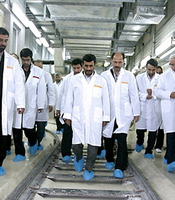After months of speculation over whether Russia and China would come on board for a new round of sanctions against Iran, the parameters of a new United Nations Security Council resolution appear to be taking shape. Conversations between President Barack Obama and his Russian and Chinese counterparts, Dmitry Medvedev and Hu Jintao, at this week's Nuclear Security Summit seem to have produced a consensus among the "permanent five" Security Council members. Two obstacles remain: the actual crafting of any resolution -- and whether the final product will pass muster with the U.S. Congress.
Up to now, the Obama administration has been successful in getting both the House of Representatives and the Senate to hold off from finalizing much stronger economic sanctions that would be imposed not simply against Iran, but also against the companies of other countries that continue to do business with the Islamic Republic. The president argued that having a new secondary sanctions bill on his desk would complicate his efforts to put together a stronger international coalition to pressure Tehran over its nuclear program. Both houses of Congress have passed versions of this legislation, but instead of a rapid conference process that could have sent the bill to the White House in February, congressional leaders accepted Obama's assurances that the Security Council would pass a stronger sanctions regime at some undefined point in the "spring" of this year.
To bring other states on board, however, the Obama team has taken a page out of the "Bush-Baker" playbook: limiting overall U.S. objectives in order to achieve "buy-in" from other major players. The United States is likely to get a new sanctions process that specifically targets the firms and Iranian governmental entities engaged in the sub rosa activities of Iran's nuclear program. The ultimate goal continues to be keeping Tehran on the "straight and narrow" of producing energy for civilian use, by pressuring it to end any efforts towards producing a nuclear weapon and to accept stricter monitoring of its nuclear program.

